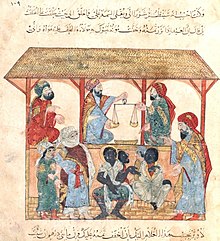
Back الرق في الإسلام Arabic ইসলাম ধর্মে দাসত্ব Bengali/Bangla Caethwasiaeth ac Islam Welsh Sklaverei im Islam German بردهداری در اسلام Persian Orjuus islamilaisessa maailmassa Finnish Traite arabo-musulmane French עבדות באסלאם HE गुलामी पर इस्लाम के विचार Hindi Ստրկությունը իսլամում Armenian
Islamic views on slavery represent a complex and multifaceted body of Islamic thought, with various Islamic groups or thinkers espousing views on the matter which have been radically different throughout history. The Quran and the hadith (sayings of Muhammad) are the sources used for Sharia ,where the legislation concerning slaves is derived from.[1]
The Quran does not outline the rights of slaves expansively, but rather highlights the virtues in freeing slaves. The Qur'an mentions various ways slaves could be freed: as a general good deed, as a use for Zakat, through a contract and as expiation for sins.[2]
The hadiths, which differ between Shia and Sunni,[3] address slavery extensively, assuming its existence as part of society but viewing it as an exceptional condition and restricting its scope.[4][5] The hadiths forbade enslavement of dhimmis, the non-Muslims of Islamic society, and Muslims. They also regarded slaves as legal only when they were non-Muslims who were imprisoned, bought beyond the borders of Islamic rule, or the sons and daughters of slaves already in captivity.[5]

Many early converts to Islam were the poor and former slaves. One notable example is Bilal ibn Rabah al-Habashi, who is noted for being the first Muezzin.[8] In modern times, various Muslim organizations reject the permissibility of slavery and it has since been abolished by all Muslim majority countries.[9] However, there are extremist groups who have revived slavery while they were active.[10]
- ^ "Understanding Sharia: The Intersection of Islam and the Law | Council on Foreign Relations". www.cfr.org. Retrieved 2024-08-31.
- ^ Brown, Jonathan A.C. (13 August 2019). Slavery and Islam. Oneworld.
- ^ "Development of History and Hadith Collections". www.al-islam.org. 2013-11-12. Retrieved 2024-08-31.
- ^ "Sahih Bukhari | Chapter: 48 | Manumission of Slaves". ahadith.co.uk. Retrieved 2024-08-31.
- ^ a b "BBC - Religions - Islam: Slavery in Islam". www.bbc.co.uk. Retrieved 2024-08-31.
- ^ Jonathan E. Brockopp (2000), Early Mālikī Law: Ibn ʻAbd Al-Ḥakam and His Major Compendium of Jurisprudence, Brill, ISBN 978-9004116283, pp. 131
- ^ Levy (1957) p. 77
- ^ Robinson, David (2004-01-12). Muslim Societies in African History. Cambridge University Press. ISBN 978-0-521-53366-9.
- ^ "University of Minnesota Human Rights Library". 2018-11-03. Archived from the original on 2018-11-03. Retrieved 2024-08-30.
{{cite web}}: CS1 maint: bot: original URL status unknown (link) - ^ "ISIS and Their Use of Slavery". International Centre for Counter-Terrorism - ICCT. Retrieved 2024-08-30.